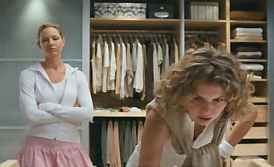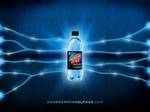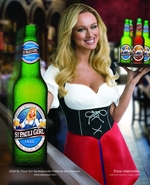FirstBank Makes Ski Mask Joke. Oh, How Gauche!
Posted in: UncategorizedKia Soul Makes Strangers Stare
Posted in: Uncategorized
The new Kia Soul is so compelling you will want to look deeper. And to depict this in the most obvious way possible, Publicis/Toronto came up with “Peer Into a Soul.”
Asics Appropriates Chinese Legend for ‘Made of Japan’
Posted in: Uncategorized
Continuing Asics’ campaign/pop culture tribute “Made of Japan” for Onitsuka, Amsterdam Worldwide developed “Zodiac Race,” a by-land-and-sea battle between future members of the The Jade Emperor’s Zodiac Calendar.
‘Look at that Detailing. That is a Sweet Ride, Right There.’
Posted in: Uncategorized
Last week we reviewed a St. Lukes ad for IKEA’s PAX wardrobe, which wordlessly depicted women being jostled about in an ongoing quest for safe haven.
‘Behind every detail … there’s a detail.’
Posted in: Uncategorized
In “House of Cards,” Lexus showcases its buttery engine and vibration absorbing capabilities with not one but many houses (and towers and turrets and a single Parthenon) of cards.
Quick Dry Still Life, De-Classed Coke, Analytics Dig Deep
Posted in: UncategorizedCoke Super Bowl Spot, Surveillance Beetles, Ingestible Syke
Posted in: UncategorizedIKEA Gives Every Girl Her Space
Posted in: UncategorizedNike Channels Transformative Sister Magic
Posted in: UncategorizedRecharging Dead Voltage, Inspiring Ads, SocNet Cannibalism, Pubfatico
Posted in: UncategorizedKatarina Van Derham Named St. Paulie Girl For 2009
Posted in: UncategorizedKatarina Van Derham Named St. Pauli Girl For 2009
Posted in: UncategorizedCoke Brings Strange Love to Library
Posted in: Uncategorized
OK. Let’s analyze this new Coke commercial, part of the new Wieden + Kennedy-created Open Happiness campaign.
American Apparel Hooks Up With Chictopia Bloggers
Posted in: UncategorizedGiven the Chance, Could YOU Conquer Either Finish Line?
Posted in: UncategorizedThe Hudson Crash: Just One More Reason to Fly Virgin
Posted in: UncategorizedSkittles Loses the Plot.
Posted in: Uncategorized
In the latest of its “_______ THE RAINBOW, TASTE THE RAINBOW!” ads, Skittles gives us the perplexing “Tailor.”
Dunkin’: You Don’t Have to Be Bright to Be a Go-Getter!
Posted in: UncategorizedYou kin’ do it!” Dunkin Donuts exclaims in the 2009 debut of its new ad campaign, where people like you! power through everyday life with the will and guilelessness of Special Olympics athletes.
Virgin Atlantic: Still Red-Hot After All These Years
Posted in: Uncategorized
To celebrate Virgin Atlantic’s 25th anni, “Still Red Hot” brings us back to June 22nd, 1984, when London’s Gatwick Airport changed forever.












